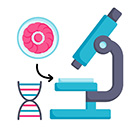
Polycystic Ovary Syndrome (PCOS): A Personal Perspective on Understanding, Diagnosis, and Treatment
As a fertility specialist, I’ve had the privilege of walking alongside countless women who are navigating the often difficult and confusing journey of trying to conceive. One of the most common conditions I encounter in my practice is Polycystic Ovary Syndrome (PCOS). It’s a condition that affects around 1 in 10 women of reproductive age, yet it often remains misunderstood. Over the years, I’ve seen how a clear diagnosis, early intervention, and personalized care can transform the path to motherhood for many women with PCOS.
I want to share with you my personal experience with PCOS — both as a doctor and as someone who’s seen the challenges and triumphs through the eyes of my patients.
What is PCOS?
PCOS is a hormonal imbalance that disrupts normal ovulation. The ovaries of women with PCOS often contain multiple small cysts, which are essentially follicles that failed to mature properly and release eggs. This condition can lead to irregular periods, acne, excess hair growth (often in places where men typically grow it), and even difficulty getting pregnant. Women with PCOS are also at higher risk for other health conditions like diabetes, high blood pressure, and endometrial cancer.
One thing I’ve learned over the years is that PCOS isn’t a one-size-fits-all diagnosis. Every patient is unique, and the symptoms can vary widely. For some, it’s primarily a cosmetic concern — acne, thinning hair, and unwanted facial hair. For others, the fertility challenges are more pronounced.
The Struggle With Diagnosis
The journey to a PCOS diagnosis isn’t always straightforward. It often takes months, or even years, before women come in for treatment because they’ve been struggling with irregular periods, weight gain, or skin issues. A lot of women are told by their doctors that “it’s just how their body works” or that it’s “normal to have irregular cycles.” But it’s not normal to be in constant pain or feel like your body is failing you.
I recall one patient, Sarah, a 32-year-old woman who came to me after struggling with infertility for over two years. She had been trying to conceive with her partner, but nothing seemed to work. After a few tests, it was clear she had PCOS — her ovaries were full of cysts, and her hormones were out of balance. At first, she was devastated. “How could I not know this about my own body?” she asked.
Dr. Emily Watson, an expert on PCOS and one of my mentors, once told me, “PCOS is one of the most common causes of infertility, but it is also one of the most misunderstood.” She was absolutely right. Understanding PCOS is crucial for effective treatment and long-term health.
How PCOS Affects Fertility
As I mentioned, PCOS is one of the leading causes of infertility. The hormonal imbalance can prevent regular ovulation, which is necessary for conception. Without ovulation, there is no egg to fertilize, and without fertilization, there is no pregnancy. Many women with PCOS have trouble releasing eggs, a condition known as anovulation.
But here’s the good news: PCOS doesn’t mean you can’t get pregnant. Far from it. It just means the road to pregnancy might look a little different. For Sarah, we started her on a medication called Clomid to help stimulate ovulation. We also talked about lifestyle changes, such as losing excess weight and eating a healthier diet, both of which can help restore normal ovulation in women with PCOS. After several cycles, Sarah finally got pregnant — a moment that brought tears to my eyes, as I shared in her joy.
Dr. Lisa Greenfield, a renowned reproductive endocrinologist, once said, “For most women with PCOS, fertility is not lost; it’s just a matter of finding the right path.” I believe that wholeheartedly, and I’ve seen it play out in my practice time and time again.
Treatment Options for PCOS
The treatment for PCOS varies depending on the symptoms and the patient’s goals. If you’re trying to get pregnant, medications that stimulate ovulation, like Clomid or Letrozole, are usually the first line of defense. If lifestyle changes (like diet and exercise) don’t help, we might move on to more advanced treatments like intrauterine insemination (IUI) or in vitro fertilization (IVF).
For women who are not actively trying to conceive, managing the symptoms of PCOS is the focus. Oral contraceptives (birth control) are often prescribed to regulate periods, reduce acne, and control excess hair growth. Metformin, a medication often used for type 2 diabetes, is also commonly used to help with insulin resistance, which is prevalent in many women with PCOS.
Living with PCOS
What I’ve realized over the years is that PCOS is not just a fertility issue; it’s a holistic condition that affects a woman’s physical, emotional, and psychological well-being. I’ve had patients who come in for fertility treatments, but what they really need is support for the emotional toll that PCOS has taken on their lives. One of the most common things I hear is, “I just feel broken.”
I tell them, “You are not broken. Your body is just working in a way that’s different from what you expected, but we can work with that.” Every woman’s experience with PCOS is unique, and the way we manage it needs to be tailored to the individual.
There’s also the issue of weight. Many women with PCOS find it difficult to lose weight because of the hormonal imbalance and insulin resistance. It can be incredibly frustrating, and some women feel as though they’re doing everything right but still don’t see results. I always remind my patients that weight loss isn’t just about aesthetics — it’s about health, and small steps can make a big difference in managing PCOS symptoms.
A Journey of Hope
At the end of the day, managing PCOS is not about perfection. It’s about finding what works for you and understanding that while the road may not always be smooth, it is always possible to navigate.
For women with PCOS, there is hope. With the right support, the right treatment, and a clear understanding of the condition, pregnancy is entirely possible. And even if pregnancy isn’t on the horizon right now, managing PCOS can improve your overall quality of life and health.
I’ve seen countless success stories, and as a fertility specialist, there’s nothing more rewarding than helping a woman with PCOS achieve her dream of becoming a mother. It’s a journey, and though it may have its bumps, it is a journey worth taking.







